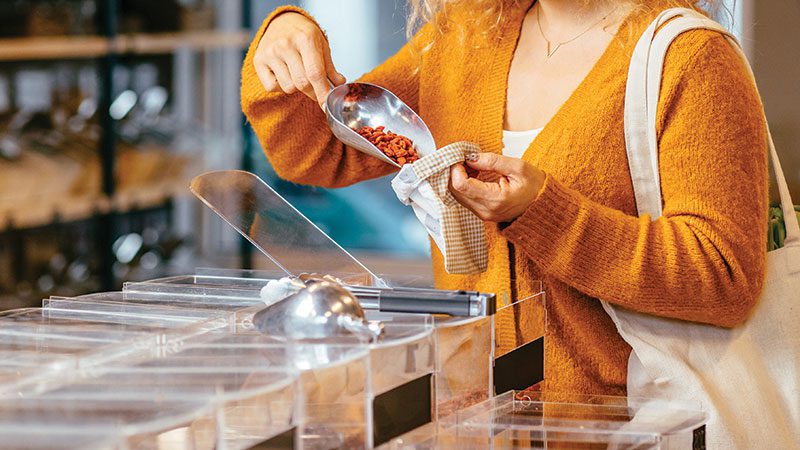PCC shoppers can soon use more of their own reusable containers in stores once again—a hard-won change in Washington state regulations, achieved through a collaboration with local health departments, according to the retailer.
It’s “a big win for less waste,” said Jennifer Beus, PCC’s vice president of operations, in a statement. It also culminates years of work on what’s been a confounding issue nationwide, with rules that have been hard to interpret or regulate.
Recently approved by county health departments for PCC stores in King and Snohomish counties, the statewide changes to the retail food code, which will begin in March 2022, will also be allowed (but not required) for any retail food stores in Washington state that choose to develop a plan and can obtain approvals.
Reusable containers used to be a common feature in co-ops and coffee shops and other businesses with a general interest in reducing waste. But they’ve become restricted in recent years, as federal guidelines become more standardized and as regulators try to balance the environmental benefits of reusable containers against any potential health risks from cross-contamination.
The new revisions are a welcome and forward-thinking move for Washington state, said Aimee Simpson, PCC’s director of advocacy and product sustainability, in a statement. They’re also an encouraging reminder that seeking regulatory changes, often a slow-moving process of incremental steps, can ultimately provide real and meaningful results.
Changes include:
- Shoppers can soon use their own clean reusable cups and mugs for drip coffee and espresso drinks.
- Shoppers can soon use their own clean reusable containers for many bulk foods, with some exceptions.
- The changes do not yet apply to staff-served deli foods, though potential changes are underway there, too.
“It’s exciting because we’re lessening our footprint,” said Bridget Milligan, PCC’s food safety manager, who has been working with state and local authorities on how to turn the ideas into reality.
PCC has been involved throughout the long process, pushing for changes, encouraging revisions to initial recommendations, and working with staff, suppliers, and regulators to move forward. It also took a significant investment of time and work to revise store supplies and procedures, and to educate staff and shoppers on the new rules.
It would be a lot easier for retailers to stick with the status quo instead, Simpson said—but moves like this go to the heart of PCC’s mission. “It’s one of the examples of PCC pushing through and being different, and really trying to make the change that we want to see.”
Advocates with similar goals also invested time and energy, such as the nonprofit group Zero Waste Washington, and individual PCC members who submitted letters and spoke out as well.
New signs in stores will clearly identify what’s permitted, and bins are being reorganized to make the distinctions clear and maximize the number of foods that qualify for the reusable containers. (Note that the containers have to be clean, and that reused “single-use” plastic bags are not considered acceptable under state rules.)
PCC is also researching new dispensers that would allow more foods to qualify.
Related: Just Salad Saves Waste From Landfills, Money; New Seasons Market Eliminates Single-Use Plastic Bottles.

